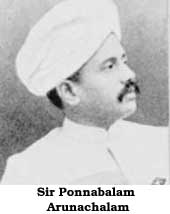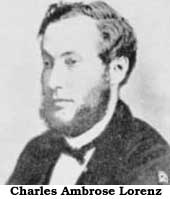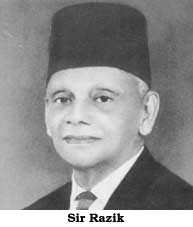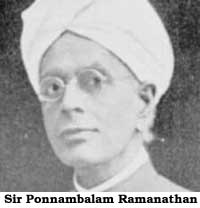

![]()
The names of Dr. Andreas Nell, Sir Ponnambalam Arunachalam and Charles Ambrose Lorenz may not be familiar to the younger generation but as we celebrate 50 years of independence, the contributions made by these eminent Ceylonese cannot be forgotten
 "
Sir Ponnambalam realised at the 1915 riots that the protest for the restructuring
of the present constitution must go on. Insulting the Sinhalese continuously
must stop and the actual reasons for the riots must be examined by an unbiased
commission and so he made a request for it on the 6th of July 1915,"
according to the book, The life of Sir Ponnambalam Arunachalam published
by the Sir Ponnambalam Arunachalam "Shathaka Jayanthi Sabhava".
And he managed to prove that the Sinhalese were not the guilty party by
forwarding true facts and figures of the 1915 riots.
"
Sir Ponnambalam realised at the 1915 riots that the protest for the restructuring
of the present constitution must go on. Insulting the Sinhalese continuously
must stop and the actual reasons for the riots must be examined by an unbiased
commission and so he made a request for it on the 6th of July 1915,"
according to the book, The life of Sir Ponnambalam Arunachalam published
by the Sir Ponnambalam Arunachalam "Shathaka Jayanthi Sabhava".
And he managed to prove that the Sinhalese were not the guilty party by
forwarding true facts and figures of the 1915 riots.
As the President of the Lanka Social Services Association, he was determined to upgrade the living standards of the labour class , regardless of racial differences. It was Sir Ponnamabalam who first pointed out that the medium of education in this country should be the mother tongue of the Lankans and not English.
"Consider the consequences of teaching British students in German .It is much more difficult to teach a Sinhalese or a Tamil student English rather than to teach a British student German. Therefore the main medium of education in Ceylon should be the mother tongue," he pointed out.
He fought to win the rights of Sri Lankans to learn and live their culture, language and religions. Although many of his proposals were overlooked by the then governors he never gave up. Among the many proposals made by him, was the proposal that students should be taught Ceylon history instead of British History.
He was not alone. Contributions to the future Ceylon to be witnessed by the generation ahead were also made by Dr.Andreas Nell.
Dr. Nell took more than an academic interest in politics and in constitutional problems. He made a special study of the functions of a second Chamber of Ceylon's parliament just prior to Independence. He was persuaded to head a group calling itself the Lanka Swaraj Party.
"His greatest service to the Ceylon of his day was the part he played in the campaign for the establishment of a residential university, away from Colombo," according to Ms.Deloraine Brohier, who has several paper cuttings and other material collected on the Burghers of the era. He was also largely responsible for the final decisions made on the site of the Peradeniya University
According to Ms.Brohier, he encouraged Burghers to study Sinhalese by awarding a scholarship, and did his utmost to promote the study of Sinhalese language. Nell always thought nationally and had no minority or communal complexes. It was said that in his later years he claimed that he had never worn any material but that made in Ceylon. Thus, he displayed his patriotism.
 Charles
Ambrose Lorenz was another patriot who belonged to the minority yet worked
with more commitment towards the benefit and the future of the country
and the people than many who belonged to the majority. Described as the
"friend of the people" by B.R. Blaze in his book, The Life
of Lorenz, his contribution to the progress of Ceylon as a journalist
and as a citizen was tremendous.
Charles
Ambrose Lorenz was another patriot who belonged to the minority yet worked
with more commitment towards the benefit and the future of the country
and the people than many who belonged to the majority. Described as the
"friend of the people" by B.R. Blaze in his book, The Life
of Lorenz, his contribution to the progress of Ceylon as a journalist
and as a citizen was tremendous.
Blaze says that many were surprised to find how much Lorenz had to do with the beginning of things in present -day Ceylon. It was he who started the movement towards obtaining responsible government for the people of this country, and he was the first unofficial member of the legislature to claim and to enjoy the right of introducing a private bill. He was a pioneer of local government, and helped inaugurate the first municipality, of which he became an original elected member. He was the father of the currency ordinance which enacted that Ceylon should switch over from pounds, shillings, and pence to rupees and cents. He initiated Ceylonese journalism and founded the first Ceylonese newspaper. He played a prominent role in the reform and development of education, the amendment and codification of the law, the inauguration of the Ceylon Railway.
Thus, was the unity and the commitment of the then Ceylonese. Their common goal was the betterment of the people and the development of the nation they served as true patriots of mother Lanka.

While we celebrate the Golden Jubilee of our independence on 4th February it is pertinent to give thought to the contributions Muslims of Sri Lanka made towards the attainment of freedom.
Muslims came to Sri Lanka as traders and not conquerors. The advent of Arabs in this country dates back to the first century A.D. according to Pliny (23-79 AD) the historian. In the early 7th century there had been a considerable number of Muslims living in Ceylon. When the Holy Prophet Mohamed (Sal) was living in the year 632 A.D., according to Hon Shashriyar in his book "Ajaib Al-Hind" or "Marvels of India" the people of Ceylon and surrounding areas set out in a delegation to visit Arabia to meet the Holy Prophet.
The late S.W.R.D. Bandaranaike said, "The Ceylon Moors have been in Ceylon as long as we Sinhalese have been here. A close bond of friendship exists between the two communities."
 In
the struggle for independence, Muslim leaders played a prominent and distinguished
role. During the early period of British rule they agitated for special
representation to the Legislative Council and made demands for safeguards
but when the struggle for independence began, they rallied round the leaders
of other communities to obtain independence. Some of the Muslim political
leaders who made valuable contributions that led to the attainment of independence
were W.M. Abdur Rahman, Sir Mohamed Macan Marker, N.D.H. Abdul Cader, Mohamed
Ishak, M.L.M. Reyal, Dr. M.C.M. Kaleel, Dr. T.B. Jayah and Sir Razik Fareed.
In
the struggle for independence, Muslim leaders played a prominent and distinguished
role. During the early period of British rule they agitated for special
representation to the Legislative Council and made demands for safeguards
but when the struggle for independence began, they rallied round the leaders
of other communities to obtain independence. Some of the Muslim political
leaders who made valuable contributions that led to the attainment of independence
were W.M. Abdur Rahman, Sir Mohamed Macan Marker, N.D.H. Abdul Cader, Mohamed
Ishak, M.L.M. Reyal, Dr. M.C.M. Kaleel, Dr. T.B. Jayah and Sir Razik Fareed.
Muslim contribution towards the welfare of labour and the struggle against the exploitation of the British is profound. M.L.M. Reyal (born in 1894) as the Vice President of the Ceylon Labour Union worked closely with A.E. Goonesinghe. He was responsible in the fight against the British for addressing the workers as "Kamkaruwos" instead of "Coolies'. Reyal brought about an awareness among the workers towards the achievement of independence of Sri Lanka.
The riots between the Sinhalese and the Muslims in 1915 took a communal turn and the British attempted to bring about a clear cleavage between the two communities. In October 1919 a rally was organised as the "Day of Mourning" of the 1915 riots near the Town Hall of Maradana where several speakers made allegations against Muslims inciting the Sinhalese. Reyal addressed this emotional gathering and cut his hand with a knife. While blood was dripping he challenged anyone from the audience to test his blood and claimed that he had Sinhala blood in him. The audience was spellbound and began to realise the ingrown presence of communalism. The people marched to the Dewatagaha mosque and took an oath that the Sinhalese and the Muslims would forget the 1915 incident and would live peacefully hereafter. He must be remembered for the brave stand that he took against the British.
W.M. Abdur Rahman (father of Sir Razik Fareed) worked with D.S. Senanayake. He was the nominated member of the Legislative Council from 1900 - 1916. He presided over at the famous fez cap rally against the British in 1905. Justice Leyard of the Supreme Court objected to the first Muslim Advocate M.C. Abdul Cader appearing in Court with his fez cap which was part of a Muslim's dress at the time. The British rulers gave into the demand of the Muslims.
W.H.H. Abdul Cader (father of Jabir A. Cader) succeeded Abdul Rahman and was a member of the Legislative Council for 15 years from 1915 - 1931. He served the Colombo Municipal Council for 30 years from 1908, and was returned uncontested to the Pettah ward every time he came forward except during his last term in office when he contested elections.
Dr M.C.M. Kaleel, who was the Chairman of the United National Party worked for the people irrespective of caste, race and religion. He was an honest politician and respected by all communities.
Sir Razik Fareed, as a member of the State Council, worked for inter-racial harmony and understanding. His famous slogan was "Sinhala/Yonaka Ekamuthukama" with which he built a strong bond between the two communities.
Sir Razik always identified himself with national parties and urged the people to eschew communal politics.
Prime Minister S.W.R.D. Bandaranaike said, "I regard Sir Razik not only as the leader of the Ceylon Moors but also as one of the greatest Ceylonese leaders".
As we celebrate fifty years of Independ ence we would do well to remember many an unsung hero who played a valiant and appreciable part during those days when our British conquerors ruled.
We have received a letter from Cardiff U.K., from Alstair A.W.Wickremsinghe about his illustrious grandfather Albert .A Wickremesinghe. He was a Christian but during the historic riots between the Muslims and the Buddhists he helped both alike.
Our country is grieving today, as Alstair says, because of the racial divisions but as far back as 1915, people like Albert Wickremesinghe gave an example of the wholesome effect of supporting their fellow men no matter their racial and religious differences.
Albert Wickremesinghe wrote a book on his reminiscences of the riots of 1915. What emerges is the story of a brave man from Kegalle who did not flinch from standing upto the mighty British when it was a matter of right and wrong. According to Albert Wickremsinghe, it all began with a rumour before Wesak of 1915 that there was going to be trouble between the Buddhists and the Muslims. The inspiring genius was, of course, our British masters.
The cause of the riots was subsequently known as Gampola Perahera case. The matter was taken to courts by Mr Wickremsinghe on behalf of his Buddhist brethren.
Many a rioter who was caught was arrested, though some managed to escape.
Mr. Wickremesinghe despite the British collected compensation for acts of vandalism. Those who refused to pay were lashed and threatened with jail. There was also a demand for a Commission of inquiry and Albert Wickremesinghe a friend of D.S.Senanayake was appointed to the Commission to gather material. More than half the signatories were Christians. Inspite of becoming a marked man Albert Wickremsinghe gave evidence before the Commission against the British.
He says he positively refused to hush up matters or become a party to an infamous bargain.
Albert Wickremsinghe though a Christian helped both Buddhists and Muslims alike, helping especially suffering women and children from both religious faiths. He even kept some of them in his own home for their safety.
Both F.R. and D.S.Senanayake greatly valued Albert A.Wickramasinghe's friendship and so D.S Senanayake hosted the Duke and Duchess of Gloucester for lunch at Albert's residence, "Wickrama" of Kegalle on their way to Kandy for the Independence celebrations in February 1948 says Alstair the grandson.
Excerpts from an address made by President J. R. Jayewardene on the life and work of Sir Ponnambalam Ramanathan, delivered under the auspices of the Vivekananda society. The address is published in the book 'Relived Memories.'
By his contribution to the national life, he helped to revive the spirits of the Sinhala people, particularly in their religion, language and in self-government.
 Ponnambalam
Ramanathan (later Sir, KC, CMG), was one who dominated the legal and public
life of Ceylon (Sri Lanka) during the last two decades of the 19th Century,
and the first two decades of the 20th Century. In the words of the first
Prime Minister of Independent Ceylon, the Rt. Hon. D.S. Senanayake, "He
was one of the greatest Ceylonese of all time."
Ponnambalam
Ramanathan (later Sir, KC, CMG), was one who dominated the legal and public
life of Ceylon (Sri Lanka) during the last two decades of the 19th Century,
and the first two decades of the 20th Century. In the words of the first
Prime Minister of Independent Ceylon, the Rt. Hon. D.S. Senanayake, "He
was one of the greatest Ceylonese of all time."
I will deal with his life as a lawyer at the unofficial Bar from 1873 to 1892 for 19 years, and as Solicitor-General from then to 1905 for 13 years, when he retired; and then as a public man during its first phase as a nominated member of the Legislative Council from 1879 - 1892 for 13 years; and in its second phase as an elected member from 1911 to his death in 1930, for 19 years.
Ramanathan was born on the 16th April 1851 at Sea Street, Colombo, a fashionable residential area then. His public life began in 1897 at the young age of 28, when he was appointed to the Legislative Council to take the place of his uncle, Sir Muthucumaraswamy. Members of his family had been appointed to the Legislative Council from its inception in 1833.
His grandfather, Gate-Mudaliyar Arumugampillai Coomaraswamy was the first, from 1833 to 1846, his granduncle Edirimanasinghe took his place from 1846 - 1861,being succeeded by Sir Muthucumaraswamy, from 1862 -1879. The famous scholar Anandacumaraswamy was Raman's first cousin .
He was educated at Royal College and passed his Law Examination in 1873.
Tributes are paid to his legal talents by his contemporaries and are available for those who read articles on his life, and references to him in the Courts in which he practiced. They all speak of his unique powers of speech in the English language, for he was termed by many Englishmen as one of the finest English speakers in any part ot the world.
His finest hour was when he was called back from retirement to contest the All lsland Educated Ceylonese Seat in 1911. This was the first occasion on which an elected seat was given to the native citizens of Ceylon. One member was to be elected to the Legislative Council from all the Ceylonese educated in English, living in the Island. Ramanathan who now lived in India was invited to contest the seat by a large number of inhabitants of the Island. My father and his elder brother Hector Jayewardene went to India and persuaded him to come to Ceylon and contest, and promised to support him. Hector Jayewardene who was then Ceylon' s most popular public speaker and politician, campaigned for him throughout the Island and won a magnificent victory for him on December 13th, 1911 against Dr. Marcus Fernando, a Sinhalese, his opponent.
Being elected to the Legislative Council, gave him an opportunity to stand up for the Sinhalese, who were harassed, bullied and even murdered during the riots of 1915, by the British of the day and his colleagues. He acted and spoke fearlessly, and won the affection and admiration of all, particularly the Sinhalese.
During and soon after the riots which took place in June 1915, the Government declared Martial Law and the shootings and atrocities committed and the fines imposed, found Ramanathan as the champion of the down-trodden Sinhalese people, speaking alone in the Legislative Council. He condemned the imposition of Martial Law. He said that though riots were taking place frequently in India, Martial Law was not declared, and the riots were suppressed by the police and the military under the normal laws. For several weeks he kept on his agitation and spoke on behalf of those who were arrested, and those who were fined drastic sums which they could not possibly pay, individually or collectively. He raised question after question on behalf of individuals and organizations about complaints of executions, arrests and enormous fines, without legal sanction. The Governor tried to suppress him from the Chair and in a reply to him in the Legislative Council in August l915, he said, "I have to perform my duty and private friendship has nothing to do with public duty."
In his book "Riots and Martial Law in Ceylon in 1915", published in England in 1916, he gives a clear and bold description of what happened. His speeches are printed here, with summaries of the 120 petitions presented in the Legislative Council complaining of the acts of injustice and oppression done by the Government.
He was now 65 years of age but he continued his work and helped to form the Ceylon National Congress in 1918. His brother Sir Ponnambalam Arunachalam became the first president. In 1921, when the enlarged Legislative Council with several elected members was conceded to Ceylon, his brother and he and the Tamil members of the Congress were disappointed because of the nomination of James Peiris (later Sir) to the Western Province seat in place of Arunachalam. Unfortunately, this issue was never resolved and Ramanathan and Arunachalam and many Tamils left the Congress in 1921. They sought unsuccessfully to chart a political course of their own for Ceylon. They failed in this and Ramanathan ceased to be the "Hero of the Nation", as he was named, for courageous services he rendered earlier to the people of his motherland, in their hour of need. The Tamils did not join a national movement till they joined the United National Party (UNP) under Mr. D.S. Senanayake in 1944 after the death of these two brothers.
Ramanathan however spoke on behalf of my father, who contested the Colombo North seat in the new enlarged Legislative Council in the General Election which took place in 1924, unsuccessfully.
If one assesses his life of service from 1879 when at the age of 28 he was first nominated to the Legislative Council, until his death in 1930 he served 32 Years as a Legislator, 13 years as a Nominated Member, and 19 years, an elected member for and during these years he placed before himself the ideal of service to his people; those who were oppressed by poverty, by injustice and were discriminated against. He did not inquire of the race, religion or caste of the victim. He feared not his opponent, be he white Governor or a uniformed official, acting under Martial Law. In the first period of his life as a Nominated Legislator, he set the example to the whole Empire of one who exposed the ills of British rule where injustices occurred in the Colonies. .
In his very first debate, he opposed certain clauses in the law to prevent coffee-stealing. Coffee was then the main export, and not tea or rubber. He said many clauses are oppressive to the people of the country, especially the Kandyan peasantry in the upcountry districts. To his last breath he said he would resist injustice and oppression. The Bill was modified and its fangs drawn out as a result of this bold and brilliant maiden speech of Ramanathan. There are many other national issues on which he spoke and raised for the first time. His name and fame spread throughout the land until he joined the public service as Solicitor-General in 1892. His fame was yet to reach its height and that too twenty five years later. Books have been written and can still be written on Ramanathan's contribution to the history of our country and its people during the period of Martial Law in 1915 and its aftermath. The tributes paid to his work by Sinhalese leaders, especially Buddhists, by associations and the press representing these very people, show the gratitude they felt for saving a people, possibly from destruction. Empire builders have done that before in various parts of the world. The Red Indians of North America, the Aztics of Mexico and the Incas of South Africa, the Aborigines of Australia, were the victims of Imperialism.
The British rulers treated the Sinhalese and those who were Buddhists no differently. The Sinhalese to them were little better than savages and Buddhism was a pagan form of worship. The leaders were arrested, locked up, and some shot without trial.
Apart from what happened during the 1915 Riots, Ramanathan during the first phase of his life in the later part of the l9th Century, and the early 20th Century, by his contributions then to our national life, helped to revive the spirits of the Sinhala people, particularly in their religion, language, education and in self-government. The tributes paid to him by Colonel Henry S. Olcott, who also made him Joint Treasurer to collect funds for the furtherance of Buddhist education, who agitated along with him to make Wesak Day a National Holiday, and also to safeguard Buddhist temporalities, made him one of the early pioneers of Sinhala Renaissance. He was even called the Tamil who was the foster-parent of the Sinhalese.
No one can disagree with the tributes paid to his life and work by D.B. Jayatilleke, D.S. Senanayake and other Sinhalese leaders.
"At the setting of the Sun and in the morning, we will remember him.".
Continue to Plus page 11 * Islam is peace
Return to the Plus contents page
![]()
| HOME PAGE | FRONT PAGE | EDITORIAL/OPINION | NEWS / COMMENT | BUSINESS
Please send your comments and suggestions on this web site to
info@suntimes.is.lk or to
webmaster@infolabs.is.lk